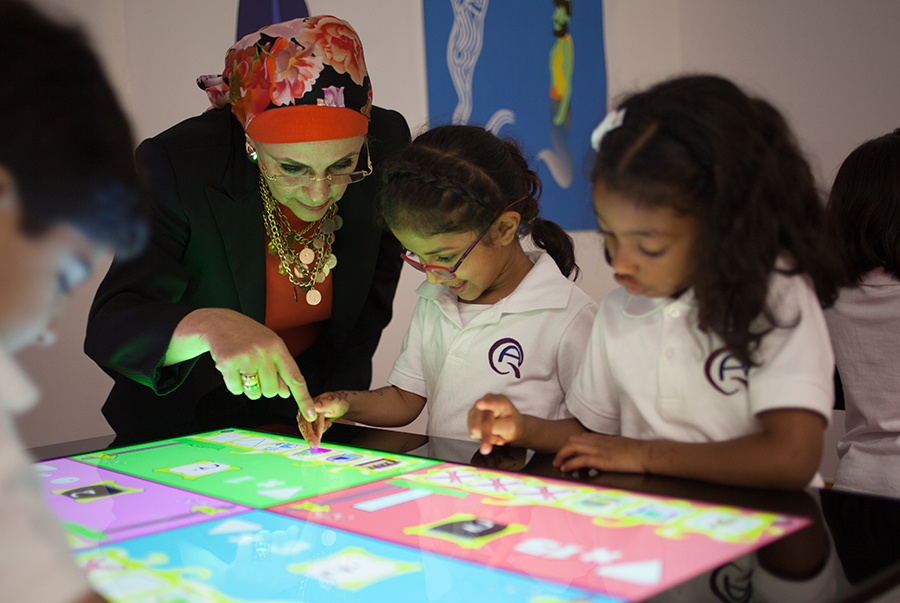Carnegie Mellon’s new technology teaches children fus-ha CMU and Qatar Academy partner to pilot new program
D. Murry EvansFriday, January 24, 2014Print this page.

DOHA, QATAR – A team of researchers at Carnegie Mellon University in Qatar have developed a new way to teach fus-ha - Modern Standard Arabic (MSA) using interactive technology. The project, “Advancing Arabic Language Learning in Qatar,” was funded by a Qatar National Research Fund (QNRF) grant in 2009 and this year, the Carnegie Mellon researchers partnered with Qatar Academy to bring their technology into kindergarten classes.
Before starting school, most Arab children do not realize that there are two variants of the Arabic language: the local dialect they speak at home and the formal version called Modern Standard Arabic (MSA). While rarely used for day-to-day interactions, MSA is the variety used in writing and formal speech.
To address the pressing need to introduce students to MSA, the team of researchers created a series of activities based on the Middle Eastern folk tale Aladdin, which they presented on large, interactive surfaces called Microsoft PixelSense. The 40-inch displays allow children to interact with the program—and each other—at any one time.
Among the activities are an alphabet bingo, where students score points by pairing objects with their first letters, and a storyboard, where students recreate the Aladdin tale by placing scenes in the right order. While the lessons meet Qatar’s Supreme Education Council Arabic curricula, this is the first time such an approach has been used in Qatar.
The researchers set out to not only help students learn to read and write, but also to build positive attitudes toward MSA and highlight the relationship between MSA and the local dialect. To be successful, Ibrahim knew they would need to look beyond traditional teaching methods.
“When I interviewed older students about their experiences learning formal Arabic they said it was like going back a century, so we knew we’d have to get creative to capture children’s interest,” said Zeinab Ibrahim, a professor of Arabic at Carnegie Mellon University in Qatar and a renowned sociolinguist.
Jameela Al Shammari, an Arabic and Islamic Studies teacher at Qatar Academy, said the Aladdin Project, as it’s referred to at the school, has made a big difference in her kindergarten class.
“I’ve been teaching here for four years, and I always try to make my classes interesting and interactive, but it can be challenging since there are very few digital resources out there for teaching Arabic. This project has really captured the students’ interest, and working around the large screens has helped them listen, share and work in teams,” she said.
The project stemmed from a multidisciplinary team, including Ibrahim, Pantelis Papadopoulos, a research associate in computer science who specializes in educational technology, and Andreas Katatsolis, a professor of communication and design. Supporting them were Ezzohra Moufid, a research assistant at Carnegie Mellon University Qatar, Sara Shaaban, a freelance designer, and Abbas Al-Tonsi, a senior lecturer at Georgetown University of Foreign Service in Qatar and a consultant on the project.
The program is also tracking the students’ progress, allowing the researchers to do an in-depth analysis at the end of the semester. There are hopes of offering workshops next year to train the other Arabic teachers at Qatar Academy, and other local schools in the future.
About Carnegie Mellon University in Qatar
As a global leader in education, Carnegie Mellon University is known for its creativity, collaboration across disciplines, and top programs in business, technology and the arts. The university has been home to some of the world’s most important thinkers, among them 18 Nobel Laureates and 11 Turing Award winners.
In 2004, Qatar Foundation invited Carnegie Mellon to join Education City, a groundbreaking center for scholarship and research. As Carnegie Mellon Qatar celebrates its 10th anniversary, the campus continues to grow, providing a prestigious education to 400 students from 42 countries. The university offers five undergraduate degree programs in Biological Sciences, Business Administration, Computational Biology, Computer Science and Information Systems.
Students in Qatar join more than 12,000 Carnegie Mellon students across the globe, who will become the next generation of leaders tackling tomorrow’s challenges. The university’s 90,000 alumni are recruited by some of the world’s most innovative organizations.
To learn more, visit www.qatar.cmu.edu and follow us on twitter @CarnegieMellonQ
D. Murry Evans | +974 4454 8490 | dmevans@qatar.cmu.edu
